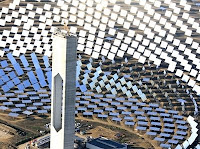
In these days, when mankind is so dependent on energy, it is essential to seek new ways of producing energy without pollute or affect our planet. The way how we get most of our energy is polluting our planet, and exhausting his already limited resources. A dramatic shift is taking place in government energy policies, mainly in developed countries. We have many ways to produce clean energy without exhausting the resources:
- - Solar power (converting the light of the sun into electric energy using solar cells);
- - Biomass ( biological materials that contains stored solar energy that was absorbed in photosynthesis);
- - Wind Power ( made by using airflows to run wind turbines and turn on the generator that produce energy);
- - Hydropower (the use of moving water energy which the operation a various machines allow the production of energy)
- - Geothermal energy ( extracting the energy of Earth's heat).
We have more sustainable ways to produce energy, but this ones are the mainly ones. The investment in clean energies is increasing, but is not sufficient to rebalance de exploration of the planet's resources. “All we have to do is stop chilling the Earth and start looking to the sky”
Source:
http://www.alternative-energy-news.info/technology/wind-power/
http://en.wikipedia.org/wiki/Renewable_energy_source
http://www.greenfacts.org/en/energy-technologies/index.htm
http://en.wikipedia.org/wiki/Hydropower
Quotations from the film HOME by Yann Arthus-Bertrand.


